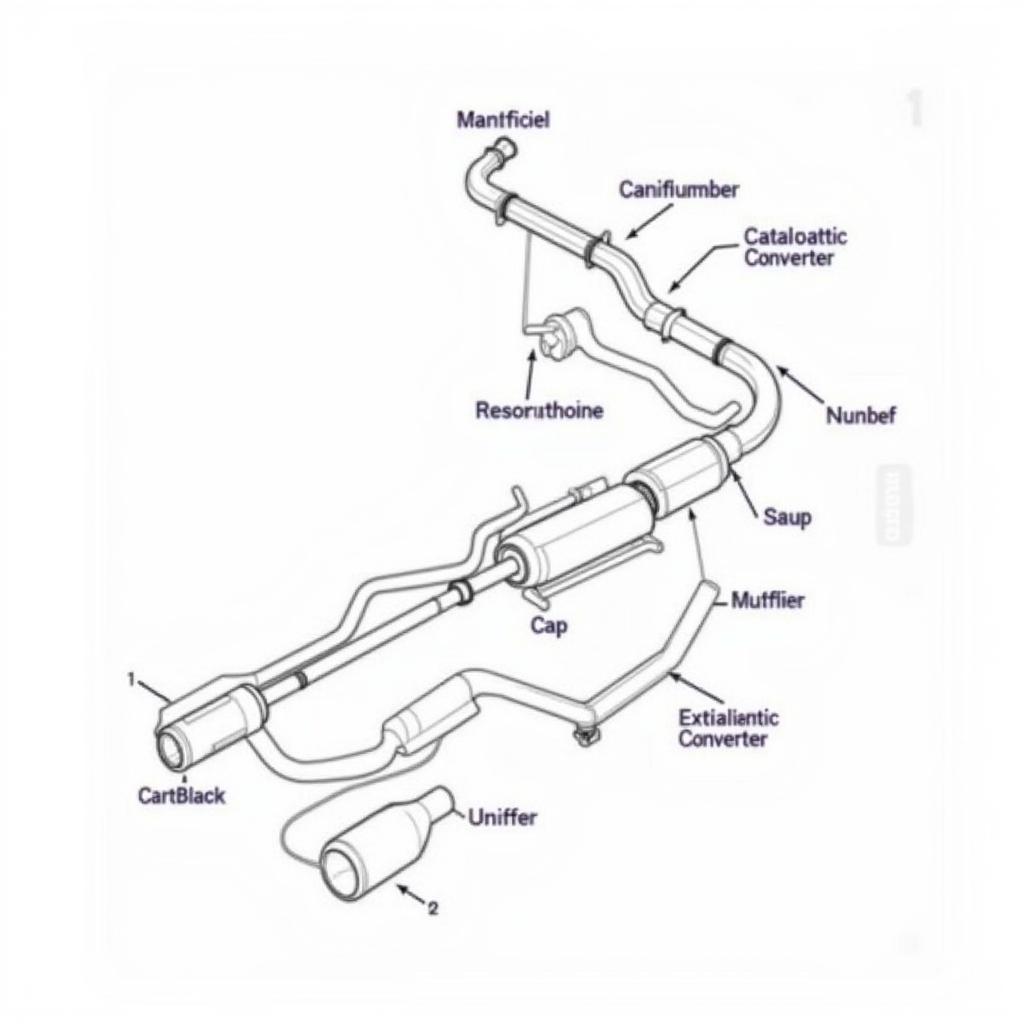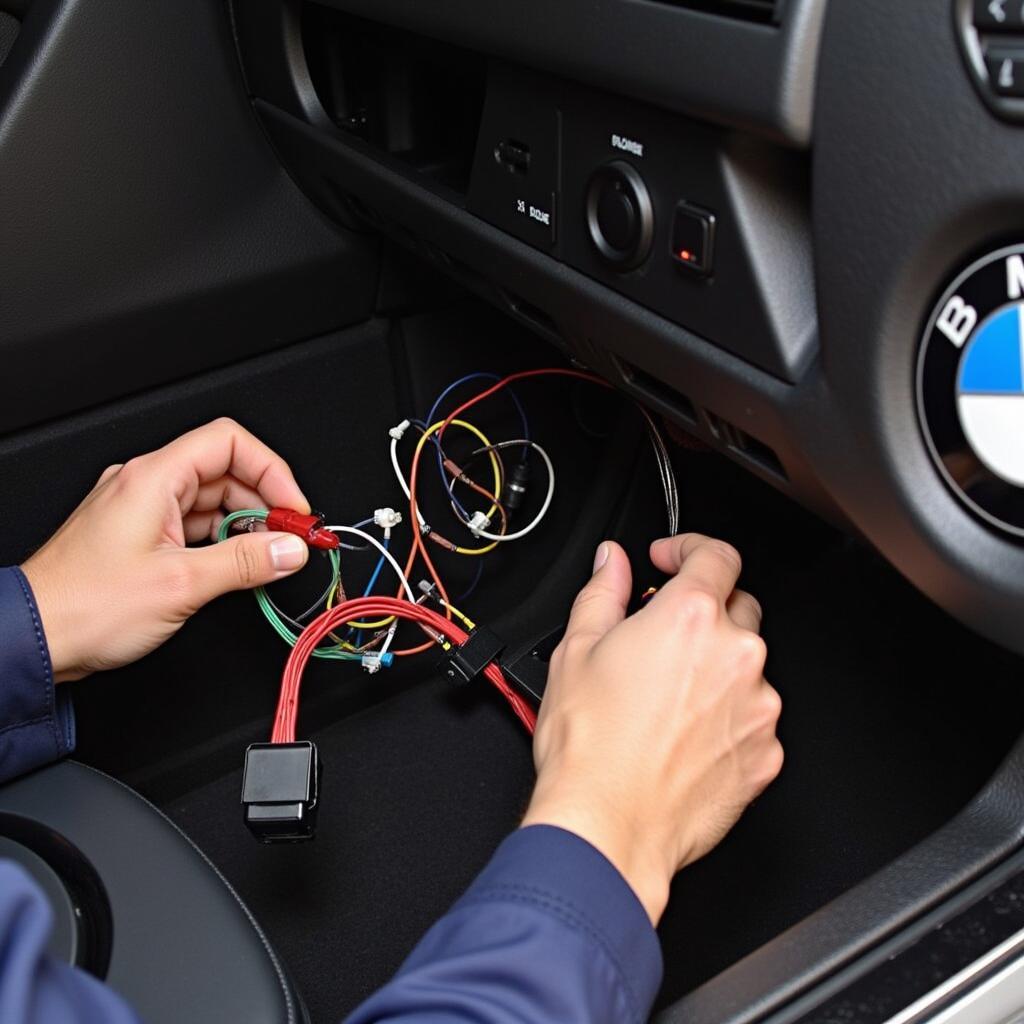The distinct purr of a BMW 745i is instantly recognizable, but what happens when that iconic exhaust sound changes? This guide delves into the intricacies of the BMW 745i exhaust sound, covering common issues, diagnostic techniques, and solutions. We’ll explore everything from subtle nuances to significant problems, helping you understand the symphony coming from your tailpipe.
Understanding Your BMW 745i Exhaust System
The exhaust system is more than just a muffler; it’s a complex network of components working together to manage exhaust gases, control emissions, and contribute to the signature BMW 745i exhaust sound. Key components include the exhaust manifold, catalytic converter, resonator, muffler, and tailpipes. Each part plays a crucial role in shaping the sound and performance of your vehicle.
The Role of the Exhaust Manifold
The exhaust manifold collects exhaust gases from the engine cylinders and channels them into the rest of the exhaust system. Its design influences back pressure and, subsequently, engine performance and exhaust sound.
The Catalytic Converter and Emissions Control
The catalytic converter is crucial for reducing harmful emissions. It converts toxic gases into less harmful substances before they exit the tailpipe. A malfunctioning catalytic converter can impact both emissions and exhaust sound, often resulting in a rattling or hissing sound.
Resonator and Muffler: Shaping the Sound
The resonator and muffler work in tandem to refine the exhaust sound. The resonator primarily cancels out unwanted frequencies, while the muffler reduces the overall volume. These components are key to achieving the characteristic BMW 745i exhaust sound.
 BMW 745i Exhaust System Components Diagram
BMW 745i Exhaust System Components Diagram
Common BMW 745i Exhaust Sound Issues
Several issues can alter the BMW 745i exhaust sound, ranging from minor annoyances to serious problems. Recognizing these issues early is crucial for preventing further damage and costly repairs.
Exhaust Leaks: From Hisses to Roars
Exhaust leaks can manifest as hissing, popping, or roaring sounds. They often indicate a problem with the exhaust manifold gasket, cracked pipes, or loose connections. Ignoring these leaks can lead to decreased fuel efficiency and increased emissions.
Rattling and Vibrations: A Sign of Trouble
Rattling or vibrating sounds from the exhaust system may suggest a loose heat shield, a failing catalytic converter, or damaged internal components within the muffler or resonator.
Changes in Exhaust Tone: Identifying Subtle Shifts
A change in the exhaust tone, such as a deeper rumble or a higher-pitched whine, can be an early indicator of a developing problem. It’s essential to pay attention to these subtle shifts and address them promptly.
Diagnosing BMW 745i Exhaust Problems
Accurate diagnosis is essential for effective repair. Several methods can help pinpoint the source of your BMW 745i exhaust sound issues.
Visual Inspection: A First-Line Approach
A thorough visual inspection can reveal obvious signs of damage, such as cracks, rust, or loose components. This is often the first step in diagnosing exhaust problems.
Listening for Clues: Identifying Sounds and Their Location
Carefully listening to the exhaust sound can provide valuable clues about the problem’s location and nature. Different sounds often indicate specific issues.
Professional Diagnostics: Advanced Tools and Expertise
For complex issues, professional diagnostic tools and expertise are essential. These tools can pinpoint problems that are difficult to detect through visual inspection or listening alone.
“Regular inspections and addressing minor exhaust issues promptly can prevent costly repairs down the road,” says Michael Schneider, Senior Automotive Technician at Bavarian Motor Works Specialist.
Solutions for BMW 745i Exhaust Sound Problems
Depending on the diagnosed issue, various solutions are available to restore your BMW 745i’s exhaust sound and performance.
Repairing Exhaust Leaks: Restoring Integrity
Exhaust leaks are often addressed by replacing gaskets, welding cracked pipes, or tightening loose connections.
Replacing Damaged Components: Ensuring Optimal Function
Damaged components like catalytic converters, resonators, or mufflers may require replacement to restore proper function and exhaust sound.
Performance Exhaust Upgrades: Enhancing Sound and Performance
For those seeking a more aggressive sound or enhanced performance, aftermarket exhaust systems offer various options to customize the BMW 745i’s exhaust note.
Conclusion
Understanding your BMW 745i exhaust sound is key to maintaining its performance and enjoying its iconic purr. By recognizing common issues, employing proper diagnostic techniques, and implementing appropriate solutions, you can ensure your 745i continues to deliver the driving experience it’s known for. Remember, addressing exhaust problems promptly can prevent further damage and maintain the signature BMW 745i exhaust sound you love.
FAQ
- What are the most common causes of a rattling exhaust sound?
- How can I tell if my catalytic converter is failing?
- Is it safe to drive with an exhaust leak?
- What are the benefits of upgrading to a performance exhaust system?
- How often should I have my exhaust system inspected?
- What is the typical cost of repairing an exhaust leak?
- How can I find a qualified mechanic to work on my BMW 745i’s exhaust system?
Common Scenarios and Questions
- Scenario: My BMW 745i is making a loud roaring sound. Question: What could be causing this?
- Scenario: I noticed a hissing sound coming from under my car. Question: Is this an exhaust leak?
- Scenario: My exhaust sounds different than it used to. Question: Should I be concerned?
Related Articles
- BMW 7 Series Maintenance Guide
- Troubleshooting Common BMW Issues
- Understanding Your Car’s Exhaust System
Need assistance? Contact us via Whatsapp: +1 (641) 206-8880, Email: CARDIAGTECH[email protected] Or visit us at: 276 Reock St, City of Orange, NJ 07050, United States. Our customer service team is available 24/7.


